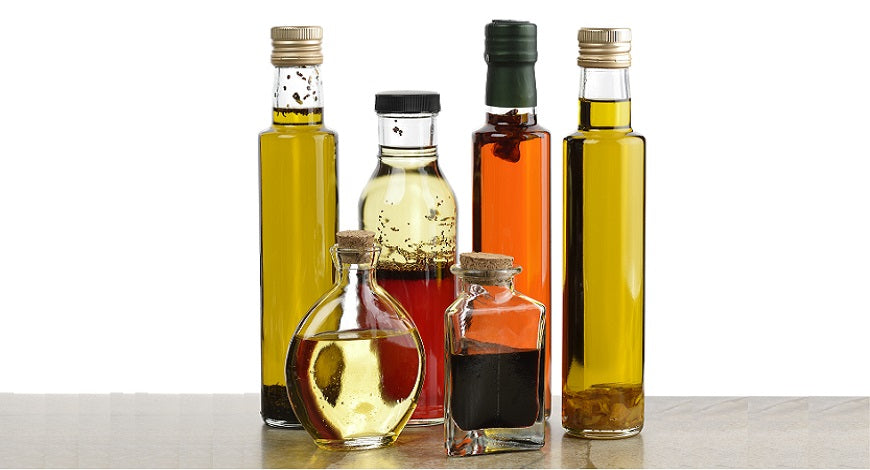Many health experts advise us to avoid frying and roasting in oils, but anyone who cooks for a family understands how unrealistic that advice is. Many healthy foods can be fried for a bit of variety in a family's diet and they taste so good that few families want to let them go. If this sounds like your family, do not lose hope, some oils are healthy to use.
Oil Extraction
The extraction process can spoil the health properties of vegetable oils. The most natural method is when the vegetables, nuts or seeds are pressed or rolled under or between heavy bars. The label usually indicates that it was "expeller pressed." These oils are unfortunately a bit pricey because this primitive extraction method takes more time than some modern methods and hence produce less oil. It is by far the healthiest, however, because the oil is still in its natural plant form.
The most common extraction method is chemical extraction, where manufacturers use chemical solvents (such as hexane) to extract the oil from the vegetables, nuts, and seeds. Hexane is produced through the refining of crude oil and is currently being phased out because of its toxicity. Since the chemicals that will replace it are also industrial, rather than natural, the best approach is to avoid chemically extracted oils altogether.
Oil Refinement
One of the unhealthiest characteristics of most cooking oils is the process of hydrogenation that they undergo in the factory. Hydrogenated oil contains trans fats that have been found to increase the risk of cholesterol and heart disease. Vegetable oils are naturally fluid at room temperature, but many consumers prefer oils that remain solid when taken out of the fridge, like margarine, or are thick at room temperature, like most supermarket bought cooking oils.
The industrial solution is to heat the oils to extremely high temperatures before adding metals that, through a chemical reaction, creates hydrogen in these vegetable oils. This process guarantees that they do not become runny and that they last longer before becoming rancid.
This is also how the trans fat is created, which is the unhealthiest fat physicians think we can eat.
Look for descriptions like "partially hydrogenated", "fully hydrogenated", "trans fat" or "thermally refined" on labels and avoid them. The thickness of the oil may make it easier to work with in the kitchen, but it makes it too difficult for your heart to pump. It then sticks inside your arteries and increase your chance of suffering from heart disease.
Other refinement processes can change the oils and produce an unhealthy final product too. Once the oil has been extracted via the use of chemicals, manufacturers put it through an additional heating cycle, called distilling, to extract the chemicals from the oil. BHA and BHT are preservatives, both suspected to cause cancer, that are often added to increase the oil's' shelf life. Bleaching produces a lighter coloured oil by treating it with chemicals, heating it, and filtering it to remove the coloured components. Neutralization is a process whereby the oils are treated with sodium to remove wax and other components that make the oil look natural.
Refined oils are more stable under high temperatures and look smoother, but unrefined oils are much more natural and healthy.
Smoke Point
One of the health community's objections to oils that are thermally extracted or refined is the changes in the oils' constitution. The same changes basically occur when you heat the oil on your stove at home. The smoke point of an oil is the temperature at which it starts smoking due to volatile compounds that are released in response to the heat. These compounds are mixed with your food and produce the black spots on it that researchers have linked with cancer.
This is where the health community has two problems.
The first problem is that saturated fats handle heat a lot better than the healthier fats, and opinion is divided over whether consumption of saturated fats is good for us. Although many people who lean towards the natural living way of life, including expert and well experienced doctors, feel that saturated fats are absolutely fine to consume and a lot of research is currently being published to back up this notion.
Secondly, refined oils are much more stable than unrefined oils under high temperatures because all the volatile compounds have been removed precisely to make it so.
For example, the health community's favourite oil, Extra Virgin Olive Oil, has a smoke point of 190 degrees, which is too low for frying. Refined olive oil, on the other hand, can be heated to 35 degrees higher. The difference between unrefined and refined safflower oil is even larger.
One easy rule is to heat the oil only to the required temperature and no higher. This will allow you to use some expeller pressed semi-refined oils for frying. These are slightly refined, but within acceptable limits.
Another rule is to keep more than one oil in your pantry so you can use each oil for a cooking process that remains below its unique smoking point.
For deep frying and stir frying where extreme heat is necessary (around 190 degrees centigrade), use only extra virgin avocado oil, coconut oil and virgin coconut oil.
For sautéing and other medium temperature cooking of of around 163 degrees centigrade,use extra virgin olive oil, High O Pure Sunflower Oil and sesame oil.
For low heat cooking of around the 100 degrees mark, it is best to use pumpkin seed butter, pumpkin seed oil and prune extract.
Other oils, such as; flax oil, garlic oil and hemp seed oil, should all never be heated and only added after cooking and when food has cooled.
So, which cooking oils you end up choosing to make cooking safer with really depends on how you and your family cook and the type of temperatures you heat food to on a regular basis. Ideally though, you would want to keep at least one oil in each of these groups and use it where necessary.




























Leave a comment